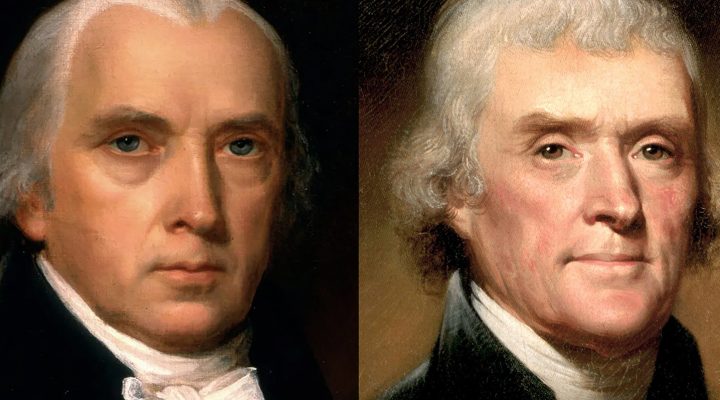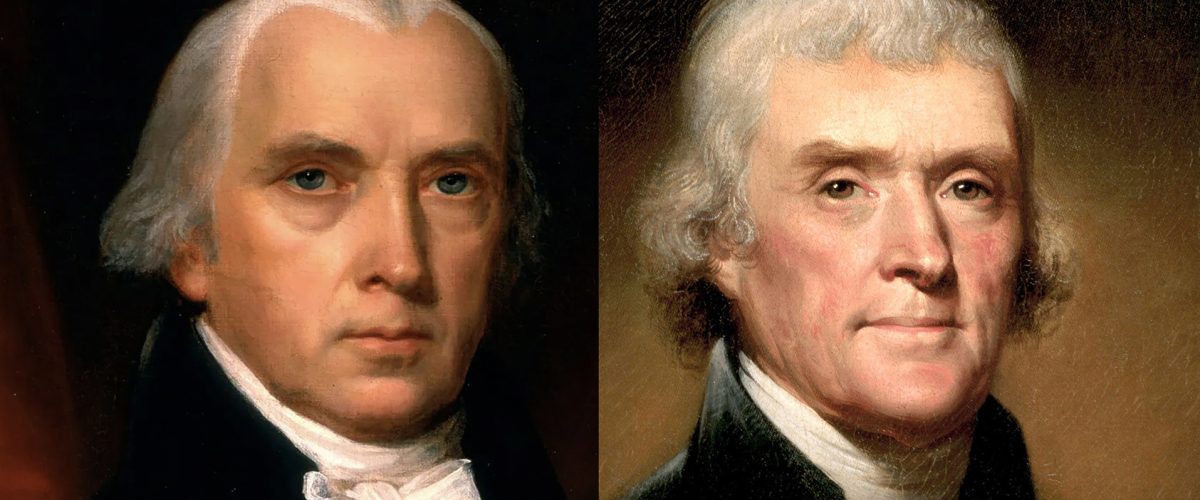For a Baptist to oppose separation of church and state feels like disowning one’s own mother without cause.
What more could Thomas Jefferson have done for Baptists than pen the First Amendment with John Leland, a Baptist preacher, looking over his shoulder?
Images from the prophet Isaiah fill the screen of my mind. The prophet saw a vision of a fertile vineyard (“on a very fertile hill”) — as in “a city on the hill.” The vineyard was well cared for — “dug and cleared of stones,” “planted with choice vines,” “a watchtower,” and “hewed out a wine vat in it” (Isaiah 5:1–6).

Rodney Kennedy
And so, citizens of the United States of America, what more could have been done for the vineyard of liberty, the citadel of religious liberty? What greater wall could have been constructed than the wall separating church and state? Why then are there efforts to dismantle that wall, preachers attempting to tear it down?
And now I will tell you what will happen if evangelical Christians ever manage to destroy the wall of separation: Our democracy will be destroyed with the breaking down of the wall “and it shall be trampled down” and become “a waste.” If the First Amendment of the Constitution is ever declared void and null by the Supreme Court, the results will be the fall of the Bill of Rights and the destruction of democracy.
Our Bill of Rights depends on the strength of the First Amendment as the Ten Commandments depend on the First Commandment.
With the rottening of the evangelical mind and the poisoning of the evangelical churches with secular politics, there has been a great falling away from the principle of separation of church and state, an apostasy unlike any ever to afflict the people called Baptists.
“There has been a great falling away from the principle of separation of church and state, an apostasy unlike any ever to afflict the people called Baptists.”
Excising the separation of church and state from Baptist faith is an act done in ignorance or in disregard for the long history of Baptist interpretations of religious liberty — and also Baptist martyrdom. These two must be considered together, because they are inextricably bound in the minds and lives of many Baptists.
The danger of deleting religious liberty and the separation of church and state is real and present because the long history of the principle has been embroiled in the current evangelical attempt to revise American history.
Baptist history supports the separation of church and state
From the Anabaptists to our current amalgamation of all kinds of Mennonites, Anabaptists and Baptists, there is a trail of blood. The martyrs of our faith will have died in vain if the separation of church and state were to depart these shores of democracy.
Cecelia, in Will D. Campbell’s Cecelia’s Sin, says: “When the tormentors set their minds, the sword falls, the flames leap up, the waters fill our bellies. It does not have to do with purity of heart. It has to do with offense to their laws.”
The history of the early Anabaptists is a history of martyrdom. Our religious liberty and separation of church and state has been written in Anabaptist blood — those who refused to bend their religious practices to the will of any government edict.
Campbell’s novella brings to life the horrors of a nation where religious liberty was unknown: “The lowering clouds of despotism and superstition hang dark over all Europe today. Scenes of violence, of bloodshed and oppression are rampant everywhere. That’s the story we have written.”
He continues: “A people who could snatch this ground from the sea will not let it be forever ruled by tyranny and falsehood. The blood of some may be in vain, but the red blood of Holland’s martyrs will paint the corners of the earth. I would die for my Lord anywhere, but I am happy that he will let me die in Amsterdam.”
Roger Williams and George W. Truett
The spirit of the Anabaptists made its way to the American colonies in the person of Roger Williams. As close to a Founding Father as Baptists ever came was our embrace of Roger Williams. He was forced to leave Massachusetts Bay Colony because of his views favoring church-state separation. The religious rulers of the colony sent Williams into exile in the middle of a harsh winter. Without the saving intervention of Native Americans, he would have perished. Williams wrote advocating a “hedge or wall of separation between the garden of the church and the wilderness of the world.”
The spirit of the Anabaptists also was imbibed by George W. Truett of First Baptist Church of Dallas. Speaking from the steps of the United States Capitol in 1920 to 15,000 people, Truett declared: “‘Render unto Caesar the things that are Caesar’s, and unto God the things that are God’s’ is one of the most revolutionary and history-making utterances that ever fell from those lips divine. That utterance, once and for all, marked the divorcement of church and state. … It was the sunrise gun of a new day, the echoes of which are to go on and on until in every land, whether great or small, the doctrine shall have absolute supremacy everywhere of a free church in a free state.”
“If they scrubbed every reference to the separation of church and state from the record, the blank sections would still be dripping in the blood of our martyrs — our faithful witnesses.”
Evangelical preachers and historical “hobbyists” like David Barton can deny the separation of church and state. They can revise our history, delete our principles, but they can’t wash the blood of our faithful saints from the pages. If they scrubbed every reference to the separation of church and state from the record, the blank sections would still be dripping in the blood of our martyrs — our faithful witnesses.
Remember where we’ve come from
Perhaps our future depends on being a people capable of remembering the martyrs who have made us what we are.
If Anabaptists and Baptists are to help God’s church to remember our story for faithful living, we will do so by following the example of Martyrs Mirror. The full title of the book is The Bloody Theater or Martyrs Mirror of the Defenseless Christians who baptized only upon confession of faith, and who suffered and died for the testimony of Jesus, their Saviour, from the time of Christ to the year A.D. 1660.
I fear we have forgotten we are servants and not “lords of the world.” We are called to persecution, not power. We are suffering servants, not ruling politicians. Stanley Hauerwas rightly says, “Our God, the God of Passover and crucifixion, is a bloody and bloodied God. Our salvation, our service to one another, is equally bloody. We are a church of martyrs.”
The Baptists deserting the house of separation of church and state claim to be defending the dogma and doctrine of the church. But they have turned upside down the reality that the dogma is not “defended” by authoritarianism and the excommunication of dissenters or by burning or drowning of alleged heretics.
The martyrs are the true witnesses to faithfulness and to the ongoing need for religious liberty and the separation of church and state.
I believe Baptists have the potential of living as a free church. By “free church” I mean a church capable of having no other foundation than Jesus Christ to sustain us rather than any arrangement dependent on state powers. A free church is one with the strength to narrate its life, and particularly the life of the martyrs, on its own terms.
When the dust clears, the wall of separation will stand
I am confident that Barton, Robert Jeffress and their tribe will not have the power to remove all the vestiges of religious liberty and separation of church and state from Baptist DNA. Even in the darkest hours of religious intolerance, God finds faithful men and women to rise in protest against bigotry, idolatry and authoritarianism.
Attempting to destroy religious liberty and the separation of church and state is a futile effort of religious cowards unwilling to allow truth to interfere with their unfettered pursuit of power.
“Even in the darkest hours of religious intolerance, God finds faithful men and women to rise in protest against bigotry, idolatry and authoritarianism.”
Who could deny the heavily compromised nature of the churches today linked as they are to capitalism, authoritarianism and power? They pretend to be advocates of religious liberty while they squelch dissent at every level. What little dissent they tolerate has no power because it is only a form of marketing. Pretty soon key concepts like “religious liberty” are reduced to empty catchphrases floating everywhere.
Like Cecelia, I would die for my Lord anywhere, but if it is necessary to give my life for the principle of separation of church and state, I am glad that it would take place here in the United States of America.
Baptists have traveled a winding road down the mountain from upholding separation of church and state to advocating for a place at the table in the White House.
On Jan. 1, 1802, the people of Cheshire, Mass., delivered a giant block of cheese weighing 1,235 pounds to President Thomas Jefferson, being presented by the famous Baptist preacher John Leland. On the block of cheese, they put Jefferson’s motto, which also appeared on his personal seal: “Rebellion to Tyrants is Obedience to God.”
After delivering the cheese, Leland was invited to preach to the president and Congress in the U.S. Capitol. The subject of his talk was “separation of church and state.”
On the morning of Donald Trump’s inauguration, Jan. 20, 2017, Robert Jeffress, a Southern Baptist minister who campaigned for Trump during the election, preached a sermon titled, “When God Chooses a Leader.” Jeffress declared God had appointed Trump to be president, that the president’s campaign promise to build a wall between the border with Mexico was part of God’s will.
That’s not what America needs most today. If we’re going to build a wall, let’s add more bricks to the wall of separation between church and state. That’s the Baptist thing to do.
Rodney W. Kennedy is a pastor and writer in New York state. He is the author of 10 books, including his latest, Good and Evil in the Garden of Democracy.
To read more on Baptists’ role in advocating for separation of church and state in America, visit a collection of essays compiled by BJC.


